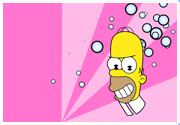The Springfield Connection
Guardian Newspapers Limited, Adam Sweeting. Saturday June 24, 2000
To celebrate 10 years of The Simpsons, BBC2 went Matt Groening-crazy. Yet though the Springfield misfits and their “wacky” creator were the subjects of two full-scale documentaries, amazingly little was revealed about either the secret of the show’s success or the inner life of its author.
The Simpsons: America’s First Family traced the story of how the series grew out of the short animation sequences Groening was making for The Tracey Ullman Show. Then, having gasped in shock at how brave Fox TV was to gamble 10 million bucks on 13 full-scale Simpsons episodes, it lapsed into an exasperating parade of “amusing” set pieces from the voice-over cast as they tried to impress us with their array of zany voices. Cut adrift from those trademark yellow drawings, they merely looked ridiculous and slightly pathetic. Then there was a line-up of famous Simpsons guest stars, including Mel Gibson and Tom Jones, which looked suspiciously like the final nail in the Simpson coffin. It’s a classic American success story – it starts off looking radical (or “edgy”, as Americans like to say), then turns into a bland celebrity bandwagon.
Later, My Wasted Life tried to present Groening as the George Lucas of animation, but instead only made him look like a successful and complacent middle-aged baby-boomer. Indeed, it was astonishing how utterly average Groening’s story was, as he recalled a childhood spent steeped in American sitcoms from the 50s and 60s, from Leave It To Beaver to Trouble With Father, droned on about his idyllic college years, and enthused about his teenage passion for Frank Zappa and Captain Beefheart. It seems his lucky break was having a father, Homer (of course) Groening, who made animated films and trashy surfer movies.
Matt Groening doesn’t give many interviews, maybe because he’s shrewd enough to recognise that while the Simpsons phenomenon is fascinating, he isn’t. Perhaps he also senses that viewers might see through his absurd claim that he has always been just a humble animator with no ambition. “I love cartooning and I love writing, and luckily I get to do it and get paid for it,” he announced, barely able to stop himself wringing his hands in an orgy of bogus self-effacement. With guileless unmotivation on this scale, it won’t be long before he accidentally ends up controlling American foreign policy from the Oval Office.
I was fortunate enough to miss the first series of Heartburn Hotel (BBC1), and having watched last night’s episode, I’ll make a point of missing the second series too. Lamenting the death of the British sitcom has become almost as dispiriting as the British sitcom, but this grim monstrosity doesn’t have anything to do with comedy. It’s more like some hideous toxic waste overspill eating its way down the corridors of Television Centre, devouring telly as we used to know it.
Squalid, rancid and misanthropic, Heartburn Hotel can boast the most detestable collection of characters since we saw the back of Pol Pot. Tim Healy plays Harry Springer, who runs a vile doss-house called the Olympic Hotel. His mate Duggie is supposed to be Scottish, as far as I could tell from Clive Russell’s delivery of what passes for dialogue. There’s also a thick bloke called Simon and an in-house lunatic called Baker.
The most fantastic aspect of it is that anybody ever imagined the plight of illegal immigrants and ex-mental patients in the clutches of a slum landlord could be comic. The portrayal of the Olympic’s multi-ethnic guests is a parade of racist stereotypes. John Sullivan unwisely put his name to it as co-author and executive producer: he should be on trial at the Hague.
We soared into the unfriendly skies with a new series of Airline (ITV), the docusoap about easyJet. Conforming perfectly to the conventions of the genre, Airline comprises a cast of characters all furiously trying to build up their own roles, while we’re supposed not to notice the laborious artifice with which this slice of “everyday life” has been constructed. With its camp, flamboyant young men and bossy ticket- desk harridans, it makes Luton airport look like a suburban unisex hairdresser’s where everybody is auditioning for a stage production of Fame.









